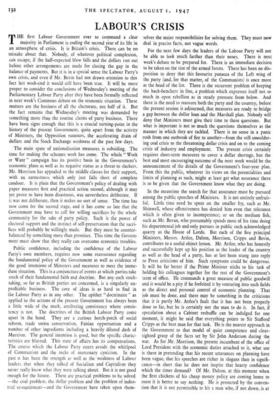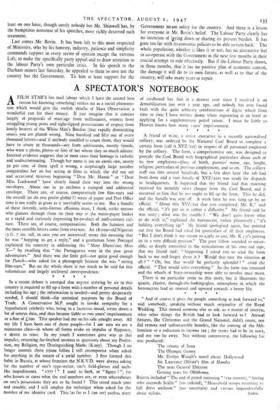LABOUR'S CRISIS
THE first Labour Government ever to command a clear majority in Parliament is ending the second year of its life in an atmosphere of crisis. It is Britain's crisis. There can be no mistake about that. Nobody, of whatever political complexion, can escape, if the half-expected blow falls and the dollars run out before other arrangements are made for closing the gap in the balance of payments. But it is in a special sense the Labour Party's awn crisis, and even if Mr. Bevin had not drawn attention to this fact last week-end it would still have been true. It will be more proper to consider the conclusions of Wednesday's meeting of the Parliamentary Labour Party after they have been formally reflected in next week's Commons debate on the economic situation. These matters are the business of all the electorate, not half of it. But the fact remains that Wednesday's meeting was demanded by something more than the routine claims of party business. There have been signs enough that this is a crucial turning-point in the history of the present Government, quite apart from the activity of Ministers, the Opposition rumours, the accelerating drain of dollars and the Stock Exchange weakness of the past few days.
The main spate of nationalisation measures is subsiding. The time for making the schemes work has come. The whole " Work or Want " campaign has its positivz basis in the Government's economic plans as well as its negative status as a threat to slackers. Mr. Morrison has appealed to the middle classes for their support, with an earnestness which only just falls short of complete candour. It is plain that the Government's policy of dealing with paper measures first and practical action second, although it may yet prove to have been disastrous, was nevertheless deliberate. If it was not deliberate, then it makes no sort of sense. The time has now come for the second stage, and it has come so late that the Government may have to call for willing sacrifices by the whole community for the sake of party policy. Such is the power of electoral support and the instinct of self-preservation that the sacri- fices will probably be willingly made. But they must be counter- balanced by something more than promises. This time the Govern- ment must show that they really can overcome economic troubles.
Public confidence, including the confidence of the Labour Party's own members, requires now some reassurance regarding the fundamental policy of the Government as well as evidence of the good intentions of Ministers and measures to meet the imme- diate situation. This is a conjuncture of events at which parties take stock of their fundamental faith and doctrine. But any such stock- taking, so far as British parties are concerned, is a singularly un- profitable business. The core of ideas is as hard to find in the Labour Party as in any other. The epithet " doctrinaire " as applied to the actions of the present Government has always been a little wide of the mark, attributing consistency where consis- tency is not. The doctrines of the British Labour Party come apart in the hand. They are a curious hotch-potch of social reform, trade union conservatism, Fabian opportunism and a number of other ingredients including a heavily diluted dash of Marxism. The general intention is good, but the specific charac- teristics are blurred. This state of affairs has its compensations. The course which the Labour Party steers avoids the whirlpool of Communism and the rocks of mercenary cynicism. In the past it has been the strength as well as the weakness of Labour leaders that when they talked of Socialism and Capitalism they never really knew what they were talking about. But it is not good enough for the future. There are practical problems to be solved —the coal problem, the dollar problem and the problem of indus- trial re-equipment—and the Government have taken upon them- selves the major responsibilities for solving them. They must now deal in precise facts, not vague words.
For the next few days the leaders of the Labour Party will not be able to look much farther than their noses. There is next week's debate to be prepared for. There is an immediate decision to be taken on the size of the armed forces. There has been no dis- position to deny that this favourite panacea of the Left wing of the party (and, for that matter, of the Communists) is once more at the head of the list. There is the recurrent problem of keeping the back-benchers in line, a problem which expresses itself not so much in open rebellion as in steady pressure from below. And there is the need to reassure both the party and the country, before the present session is adjourned, that measures are ready to bridge a gap between the dollar loan and the Marshall plan. Nobody will deny that Ministers must give their time to these questions. But what is important is not so much the questions themselves as the manner in which they are tackled. There is no sense in a panic rush from one outbreak of fire to another—from the still smoulder- ing coal crisis to the threatening dollar crisis and on to the coming crisis of industry and employment. The present crisis certainly requires short-term measures to cover a dollar shortage, but the best and most encouraging outcome of the next week would be the announcement of the details of the Government's four-year plan. From this the public, whatever its views on the potentialities and limits of planning as such, might at least get what assurance there is to be given that the Government know what they are doing.
In the meantime the search for that assurance must be pursued among the public speeches of Ministers. It is not entirely unfruit- ful. Little time need be spent on the smaller fry, such as Mr. Shinwell, whose offensiveness has denied him even that tolerance which is often given to incompetence; or on the medium fish, such as Mr. Bevan, who presumably spends most of his time doing his departmental job and only pursues in public such acknowledged quarry as the House of Lords. But each of the five principal Ministers, Messrs. Attlee, Dalton, Morrison, Cripps and Bevin, contributes to a useful object lesson. Mr. Attlee, who has honestly and successfully kept up his position as the leader of the country as well as the head of a party, has at last been stung into reply to Press criticisms of him. Such symptoms could be dangerous. It will be far better if the Prime Minister sticks to his task of holding his colleagues together for the rest of the Government's term of office. He commands a great measure of public goodwill and it would be a pity if he forfeited it by venturing into such fields as the direct and personal control of economic planning. That job must be done, and there may be something in the criticisms that it is partly Mr. Attlee's fault that it has not been properly done so far,.but he is certainly not the man to do it. In fact, if speculation about a Cabinet reshuffle can be indulged for one moment, it might be said that everything points to Sir Stafford Cripps as the best man for that task. He is the nearest approach in the Government to that model of quiet competence and clear- sighted grasp of the facts set by Sir John Anderson during the war. As for Mr. Morrison, the present incumbent of the office of Lord President with the economic duties attached to it, what use is there in pretending that his recent utterances on planning have been vague, that his speeches are richer in slogans than in signifi- cance—in short that he does not inspire that hearty confidence which the times demand? Of Mr. Dalton, at this moment when the first chickens of his cheap money policy are coming home to roost it is better to say nothing. He is protected by the conven- tion that it is not permissible to hit a man who, if not down, is at least on one knee, though surely nobody but Mr. Shinwell has, by the bumptious nonsense of his speeches, more richly deserved such treatment.
Last comes Mr. Bevin. It has been left to this most respected of Ministers, who by his honesty, industry, patience and simplicity commands support in every sector of opinion except the extreme Left, to make the specifically party appeal and to draw attention to the labour Party's own particular crisis. In his speech to the Durham miners last Saturday, he appealed to them to save not the country but the Government. To him at least support for the Government meant safety for the country. And there is a lesson for everyone in Mr. Bevin's belief. The Labour Party clearly has no intention of laying down or sharing its present burden. It has gone too far with its economic policies to be able to turn back. The whole population, whether it likes it or not, has no alternative but to co-operate with the Government in the next few months in their crucial attempt to rule effectively. But if the Labour Party shows, in those months, that it has no positive plan of economic control, the damage it will do to its own future, as well as to that of the country, will take many years to repair.



































 Previous page
Previous page